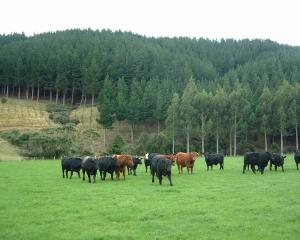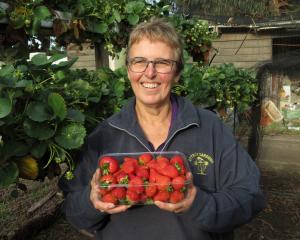
The couple have placed their cafe and 11.95ha property at Hook, on State Highway 1 north of Waimate on the market, and will move to another property they own to run sheep.
Mr Butler has lived in the Hook area his entire life and has always been on a farm.
''My parents farmed on the Lower Hook Road and had 14 cows and apple orchards on a 40-acre [16ha] block.
''Way back then Maf [Ministry of Agriculture and Fisheries] said you could make a living off an acre of strawberries. It would have been impossible to get 500 acres, so you've got to look at what you can do.
''I worked for different farmers for a while, then weaned myself off that as I got into strawberries.''
He remembers his father - who died when Mr Butler was 21 - complaining about the NZ Apple and Pear Board.
''They had ridiculous rules not designed for South Canterbury orchards - they were designed for Nelson and Hawke's Bay.
''Where we are - we're later with our strawberries and apples - it was very difficult to fit into the apple and pear regulations.''
After his father's death, Mr Butler worked with his mother and gained some more land.
''Mum had a lot of chooks and I had some pigs. Pigs and chooks didn't fit with my lifestyle; I couldn't go out with my mates to rugby and away for a couple of days; you had to look after them, so it was strawberries.
''Young farmers used to go and play up and have a bit of fun then. It was a totally different social life. We used to go to the [Hook] hall four to five times a week - rifle shooting, playing tennis, dances. Today it'd be a year or two since I've been in the Hook hall. Social life has really changed.''
When Mr Butler became involved in strawberry growing about 70 growers operated around Waimate.
''They were tough buggers.
''I remember grower meetings in the 1960s, the room would be full of moaning growers and if you said anything that was not good, you'd get a quick reply.
''One guy said, 'if you're self employed you can't be sacked ... but you can go broke!'''
Being self-employed was a major motivator for Mr Butler.
''I've always pushed Waimate strawberries and the Waimate thing over the years, just as much if not more than Butlers.''
In 1970, Mr Butler married Jacky, who was then a teacher at Centennial School in Waimate. They have three children, Christopher, Simon and Jane, and eight grandchildren.
The early years were busy.
''The strawberries were sent to Dunedin or Christchurch for the markets there and we were also exporting to Australia mainly. Then we got the peaches going.
''In those days it was nothing to sell 10 to 20 boxes of peaches to one housewife because they bottled and preserved them.
''In the 1970s and 1980s we exported to all sorts of places delivering straight to the plane in Christchurch.
''You wouldn't be able to do that now. You have to go through a dozen different agencies and inspectors.''
Mr Butler says things lifted considerably in the 1990s when they had a strong, reliable workforce of pickers - Cambodian refugees who eventually left for Australia.
The usual picking hours were from 7.30am to 3pm. The Cambodians would come for three to four months and started work in darkness at 5am.
''They would have the job done by the time the Kiwis got to work.
''This labour force really got us going; we used to send out 800 trays a day or at the very best 10,000 punnets,'' Mr Butler said.
The Butlers have dropped back on the amount of strawberries they grow and things have changed considerably since Mr Butler started. From 70 strawberry growers around Waimate the number has dropped to three
''It's cows now,'' Mrs Butler says.
The local industry is also heavily regulated and growers face tough competition from overseas.
''The biggest worry is the fresh fruit being imported into New Zealand,'' Mr Butler says.
''It can come in overnight from Chile or China.
''We can't compete with their labour.''
-By Chris Tobin















